40-year-old was sitting next to Aryeh Schupak, who died in the attack; Iranian group posts new footage of blast, claiming to have hacked security camera, but clip’s origin unclear
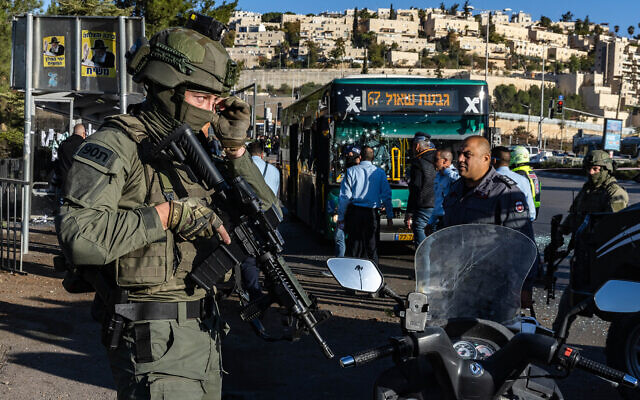
A 40-year-old man remained in critical condition Thursday morning, more than 24 hours after suffering severe head injuries in the first of two bomb attacks that struck bus stops in Jerusalem the previous day.
The man had been standing next to 16-year-old Israeli-Canadian yeshiva student Aryeh Schupak, who was killed in the blast.
Shaare Zedek Medical Center said in a statement that the hospital had treated six injured people and 17 suffering from acute anxiety attacks following the explosions.
As of Wednesday night, three remained hospitalized, including the man listed as critical, and two others in moderate condition, the hospital said.
Security officials investigating the blasts believe the attackers planted the bombs after arriving from Palestinian areas of East Jerusalem, according to unsourced reports from the Ynet news site and Channel 13 news.
One of the bombs was meant to set off a gas canister when it detonated, Channel 13 said.
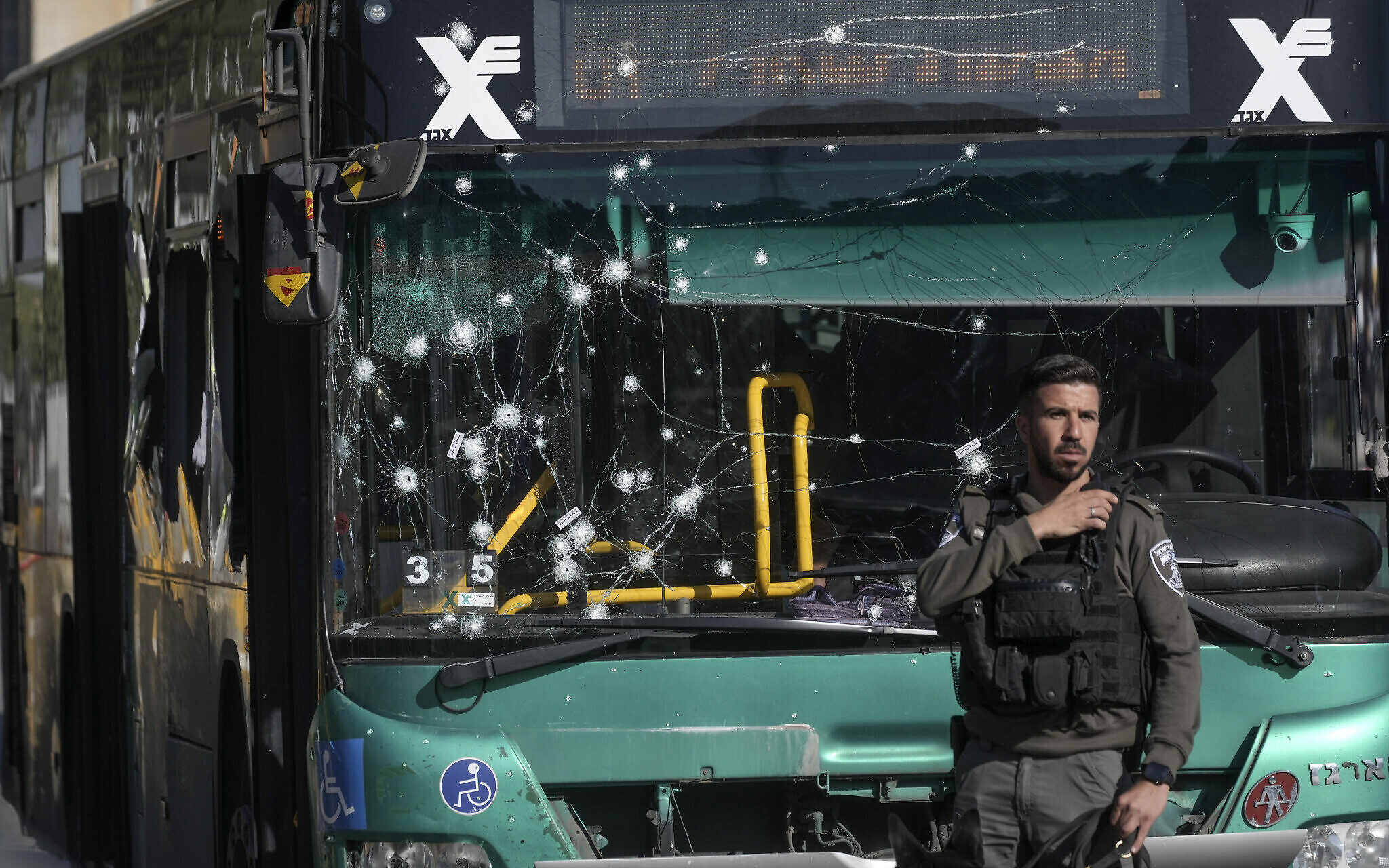
Police believe the attackers were familiar with the area and had scoped it out ahead of time. Security officials have not ruled out the possibility that the terrorists hold Israeli identification cards, the network reported.
Investigators believe the attackers arrived in the area around an hour before the bombs went off, according to the report.
An Iranian hacker group called Moses’ Staff posted previously unpublished footage of the first blast on social media, claiming it had hacked police security cameras.
“For a long time, we’ve had control over all your activities. Step by step, moment after moment. This is only the edge of our control over your activities, through access to security cameras. We said in the past we will hit at a place and time when you least expect,” the group wrote on its Telegram group.
The same group claimed responsibility in June for a cyberattack that caused rocket sirens to go off in some areas of Jerusalem and the southern city of Eilat.
It was not immediately clear who was operating the security camera that recorded the footage. Police said the footage did not come from their security cameras and that they have been in possession of the clip since Wednesday.
The Jerusalem Municipality also said that the footage was not taken by a camera belonging to the city.
Earlier the municipality and police said that cameras at the sites of the attacks were not working at the time.
קבוצת האקרים אירנית בשם Moses Staff מפרסמת תיעוד ממצלמת המשטרה שפורסם שלא פעלה על צומת הכניסה לעיר בה אירע הפיגוע הבוקר.
אם נכונים הדברים מדובר באירוע חמור שבו נפרצה חומת האבטחה של משטרת ישראל.
בקבוצת האקרים מבהירים שיש עוד הרבה חומרים בידיהם @DanielSal_87
התיעוד מהפיגוע👇 pic.twitter.com/3DylZqnsaV
— Haim Goldich | חיים גולדיטש (@HGoldich) November 23, 2022
According to the unsourced reports, security officials believe both bombs were set by the same individual, with the help of a driver who transported him between the two sites. They believe the first bomb was activated by a cellphone, while the second was set manually.
Police officials however said both bombs were remotely detonated.
No group claimed responsibility for the attacks, though they were praised by the Hamas and Islamic Jihad terror organizations.
Details of the investigation into the bombing were placed under a gag order by a court at the request of police, but officials indicated that searches were underway for the terrorist or terrorists behind the attack.
Since the attack, police have received dozens of calls reporting suspicious objects around Jerusalem as the public remains on edge. Law enforcement encouraged the public to report any suspicious objects or other concerns to the police hotline.
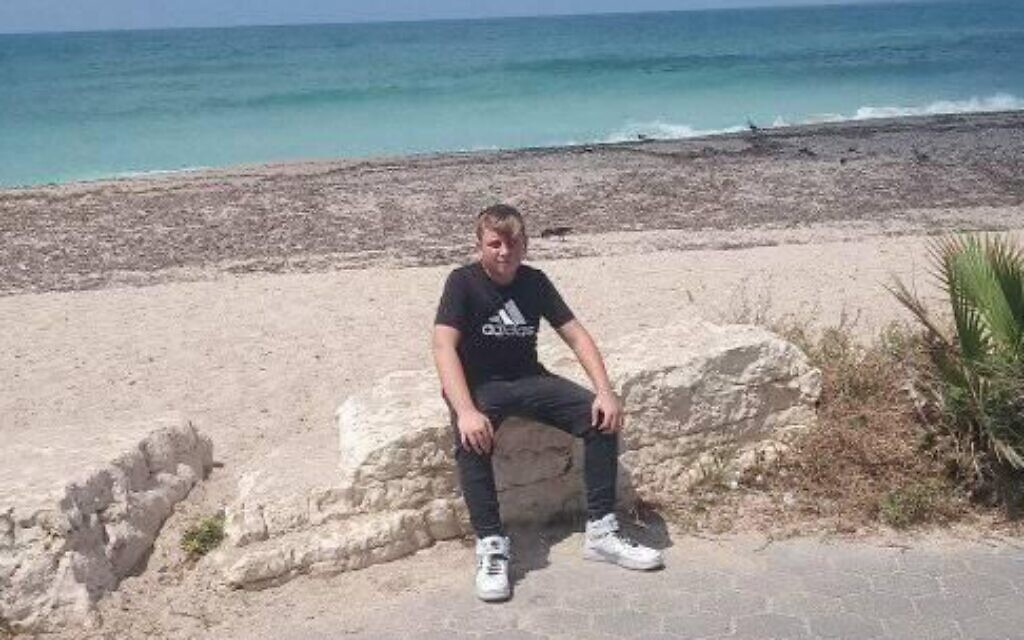
Police deployed forces to Jerusalem and other parts of the country Wednesday, while launching a manhunt for the suspected terror cell.
Jerusalem police chief Doron Turgeman ordered that the number of officers across the city be ramped up, especially in crowded areas, police said in a statement.
Authorities aimed to increase the police presence throughout the city to give “a sense of security to all the city’s residents and visitors,” the statement said
Earlier, a senior officer said police had raised their level of alert following the bombings.
Police spokesman Eli Levy said the alert level had been raised nationwide, though the most intense focus remained on Jerusalem.
The first explosion occurred close to the main entrance of Jerusalem in Givat Shaul, shortly after 7 a.m., a peak commuter hour. The second blast occurred shortly after 7:30 a.m., at Ramot Junction, where heavily trafficked roads meet, in the capital’s northwest.
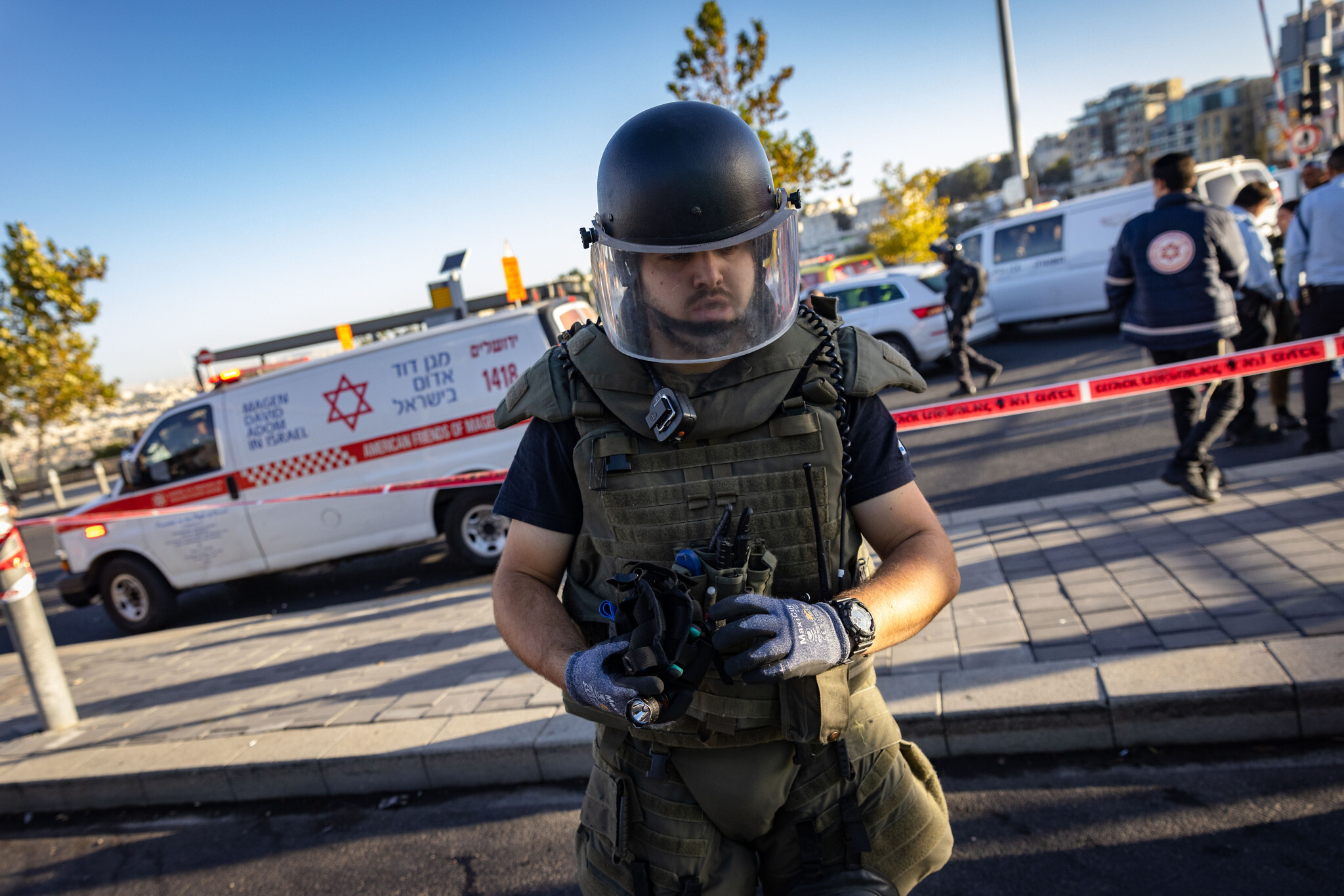
The head of the police operations division said the “two high-quality, powerful explosive devices [capable of] a high level of damage” were hidden behind the bus stop and in a bush. The remotely detonated devices were packed with nails and ball bearings to maximize casualties, according to police officials.
Due to the nature of the attacks, with two near-identical bombs exploding within half an hour of each other at two bus stops, Deputy Commissioner Sigal Bar Zvi said police suspected an organized cell was behind it, rather than just one person.
Prime Minister Yair Lapid vowed that security forces would capture the terror cell.
“We will get to them. They can run away, they can hide; it won’t help them. The security forces will get to them. If they resist, they will be killed. If not, we will deal with them with the full severity of the law,” Lapid said in remarks provided by his office, following a meeting with security officials.
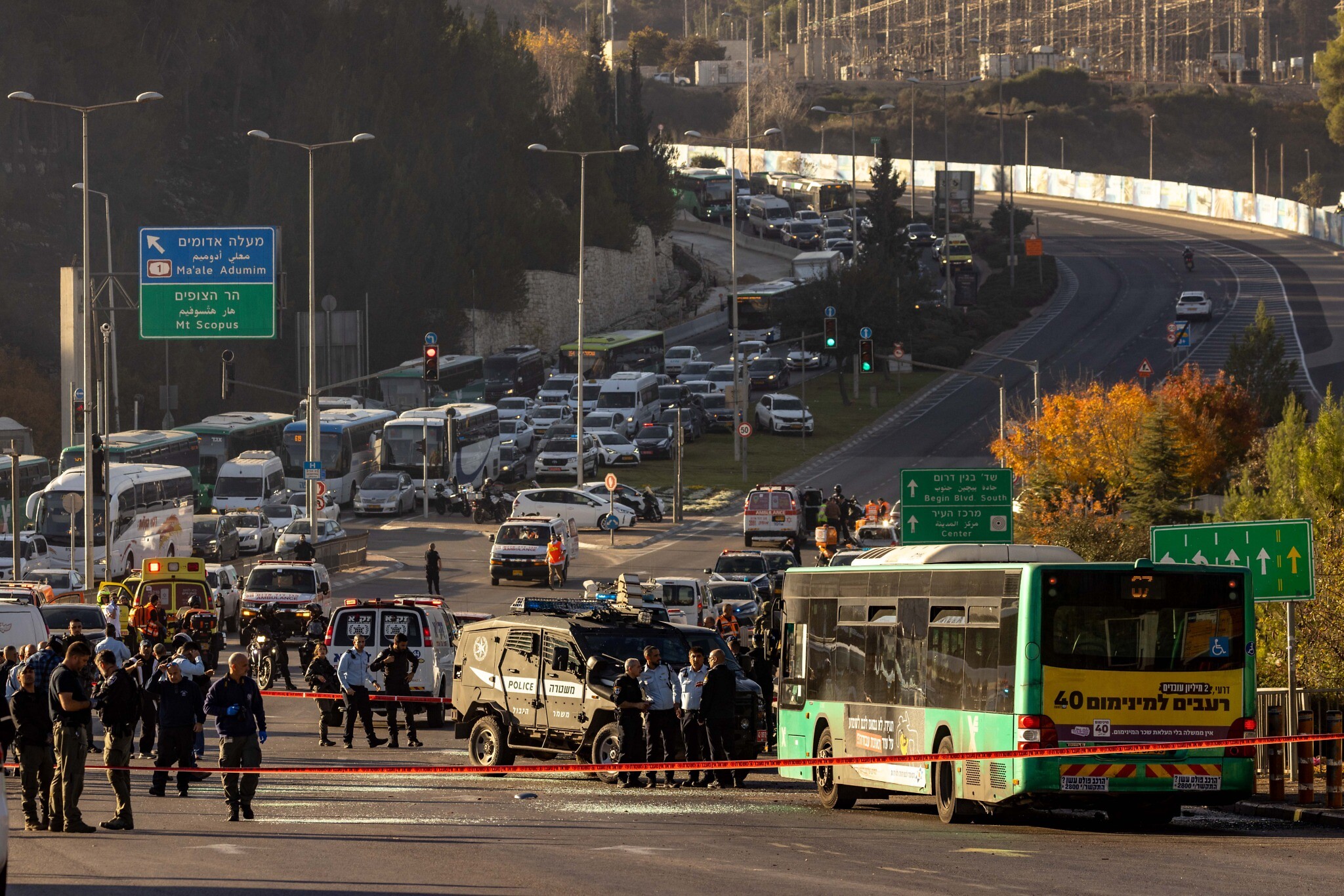
Defense Minister Benny Gantz said that those behind the attack, including planners and financiers, had “limited time” before they would be caught, following a separate meeting with military officials at IDF Central Command headquarters in Jerusalem.
IDF Chief of Staff Aviv Kohavi meanwhile ended a five-day trip to the US early, following the bombing attack, along with the news of the body of an Israeli man that had been held by Palestinian gunmen in Jenin.
The bombings came during a time of heightened tensions, following a series of Palestinian attacks that have left 30 people in Israel and the West Bank dead since the start of the year, including Wednesday’s attack.
In recent months, there have been several stabbing and attempted stabbing attacks in Jerusalem, mostly in the Old City. Last month, a Palestinian gunman killed an Israeli soldier at a checkpoint near Jerusalem.
In the spring, the military launched a major anti-terror offensive in West Bank following the attacks.
The operation has netted more than 2,000 arrests in near-nightly raids but has left about 150 Palestinians dead, many of them — though not all — while carrying out attacks or during clashes with security forces.
Bombings on buses and in public places were a hallmark of the Second Intifada from 2000 to 2005, but mostly subsided over the last 17 years, which Israeli officials attributed to increased security measures, including the West Bank security barrier, and better intelligence.
In 2016, the Hamas terror group was accused of bombing a bus in Jerusalem, leaving 21 people injured. And in 2011, a bomb hidden in a backpack exploded at a bus stop outside the Jerusalem International Convention Center, killing two and injuring dozens more.
As reported by The Times of Israel
